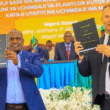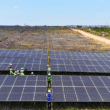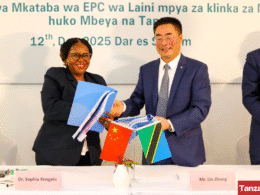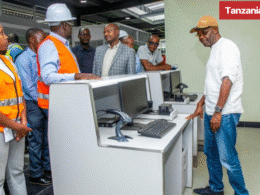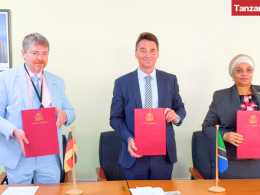TANZANIAINVEST has interviewed Mr. B. C. Muhegi, Registrar of the Tanzania Contractors Registration Board, in order to learn about the Tanzania construction sector, the role of the Contractors Registration Board and the opportunities that are available for investment within the sector.
| Mr. B.C. Muhegi, Registrar of the Tanzania Contractors Registration Board |
TI: Why was there a need to incorporate the Contractors Registration Board?
B.C. Muhegi – Contractors Registration Board: The Contractors Registration Board was established in 1997 by an act of Parliament for two main reasons.
The first was that it would protect the users of contracting services in terms of the quality of the infrastructure.
The second was to establish a legal framework and a better allotted system of protecting the players in the industry so that only competent players would be allowed to undertake construction work.
TI: What are the major deficiencies of the national construction industry?
BM: Before 1997, it was not mandatory for an individual wishing to trade with a contractor or wishing to do some civil work in the country to register with any agency.
So, we had people masquerading as contractors and it was chaos.
Given the major resources that the government had, they said it was better to form a local group to ensure that only competent firms were allowed to undertake construction work.
TI: How have things changed since 1997?
BM: Things have actually improved a lot.
Before 1997, we had no contractors registered to undertake specialized work, such as mining or electrical work.
Today, we have over 4,470 contractors registered in Tanzania, both local and foreign, out of which 3% are foreign and 97% are local.{xtypo_quote_right}Today, we have over 4,470 contractors registered in Tanzania, both local and foreign, out of which 3% are foreign and 97% are local.{/xtypo_quote_right}
Out of the 97% that are local, I would say over 94% are small contractors.
TI: What is the solution if the vast majority of companies aren’t capable of undertaking major works?
BM: We have established a fund to assist the small contractors.
The fund is called the Contractors Assistance Fund (CAF), which is actually a premise of a local commercial bank, which provides good security, advancing the guarantee for contractors who are contenders.
We have also formulated a program that is addressing problems of corporate governance, of contract management, and of resource management, including finance.
We are registering progress.
Now, we know exactly who is interested in implementing the projects and where the projects are being implemented.
TI: Can you tell me about what the local contractors still lack?
BM: There are three basic problems affecting the performance and work of the local contractors.
The first is the lack of construction equipment.
The second is difficulty in accessing credit because, although we have established the Contractors Assistance Fund, the fund is inadequate.
The third one is management: managing their companies and managing their contracts.
The major challenge is equipment because equipment is expensive.
In the developed world, a contractor will not be required to own a specific type of equipment; the contractor will rent and use that equipment for a particular job.
We don’t have those facilities in Tanzania, hence, contractors are required to own almost everything, and that makes it very difficult for them.
Consequently, we are inviting firms from abroad to come and invest in equipment because there is quite a good future in that area.
You can bring in equipment and loan them to contractors or you can bring in equipment and sell it to a contractor on an installment basis.
This year’s budget was over 777 billion Tanzanian shillings and, by and large, that is a lot of money when we consider that this budget was for the Ministry of Infrastructure alone.
There is a lot of money in the construction industry and, in fact, we are worried about the capacity to absorb all of that money within one year.{xtypo_quote}There is a lot of money in the construction industry and, in fact, we are worried about the capacity to absorb all of that money within one year.{/xtypo_quote}
We are anticipating that a lot more money is going to be infused into the industry.
Tanzania Investment Framework and Opportunities
TI: From what you are saying, almost all of the contractors in Tanzania are not capable of meeting the demands of the future. Apart from the strategy of making smaller, local contractors team up, do you think that there is an opportunity for new companies coming in?
BM: There are a lot of big opportunities for new companies, both local and foreign, to come in because, if you look at the mining sub-sector and if you look at the water sub-sector, there are a lot of big projects.
We have a lot of big projects and we have a lot of donors coming in with major projects, and we don’t have the local capacity to meet the demand from these projects.{xtypo_quote_right}We have a lot of big projects and we have a lot of donors coming in with major projects, and we don’t have the local capacity to meet the demand from these projects.{/xtypo_quote_right}
The 3% of foreign investors consists of about 100 contractors, mainly Chinese.
So, I think there are a lot of opportunities.
TI: Chinese companies seem to be aggressively getting the majority of the contracts in developing countries, like Tanzania, because the general perception is that they manage to undercut everybody else. What do you think is the good and the bad of such aggressive competition in a developing country like Tanzania?
BM: The good thing about it is that you get a good product at a cheap price.
The bad thing is that it can undercut the local companies.
It may stunt the growth of the local sector and there is the risk that in the arrangement right now, you do not develop a viable local industry.
TI: How do you balance the need for fast and cheap projects and the need to develop the national industry?
BM: We are using a very good contracting policy.
Now, we need to encourage and to provide incentives for those people who are teaming up with local firms.
TI: Are these incentives already in place or are they still in the drawing board?
BM: The incentives, as far as public performance is concerned, are already in place.
There are two types of incentives.
There are incentives that qualify you to be a valid employer in the evaluation process; that is called a PPRA.
Then, there are incentives for tax exemption or tax deferment.
TI: To conclude, what would you say to foreign investors or foreign contractors who are considering Tanzania but are still unsure of investing in the country?
BM: Tanzania is a very good country and I would say that it is very well-known.
It is very peaceful and it has very good people.
Tanzania’s industries, particularly in the contracting industry, is very young.
The players have not yet reached the international level.
My wish is to have competent international contractors or investors coming into the country.
Their entry should be a win-win situation whereby they will be able to also help grow the industry by imparting technical knowledge and working hand-in-hand with the locals.
The Contractors Board is ready to receive such investors and such contractors.


